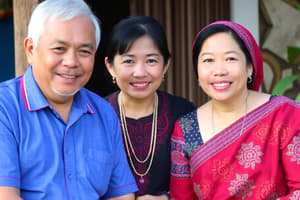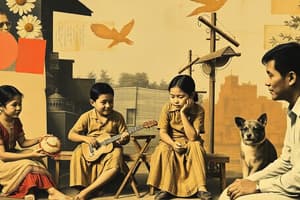Podcast
Questions and Answers
Which of the following is a significant cultural value of Filipinos?
Which of the following is a significant cultural value of Filipinos?
- Self-centeredness
- Close family ties (correct)
- Independence
- Individualism
Bayanihan refers to individualism in Filipino culture.
Bayanihan refers to individualism in Filipino culture.
False (B)
What is the Filipino tradition of serenading called?
What is the Filipino tradition of serenading called?
Harana
What are fiestas in the Philippines primarily celebrated for?
What are fiestas in the Philippines primarily celebrated for?
What do Filipinos believe can lead to a better life?
What do Filipinos believe can lead to a better life?
Filipinos highly value the presence of family more than anything, especially during ______.
Filipinos highly value the presence of family more than anything, especially during ______.
What is a key trait of the Filipino people when faced with difficult conditions?
What is a key trait of the Filipino people when faced with difficult conditions?
Which characteristic reflects the Filipino cultural value of helping others?
Which characteristic reflects the Filipino cultural value of helping others?
Extreme family-centeredness is a weakness of Filipino character.
Extreme family-centeredness is a weakness of Filipino character.
What does 'utang na loob' mean in Filipino culture?
What does 'utang na loob' mean in Filipino culture?
What is a common weakness associated with the Filipino character related to new undertakings?
What is a common weakness associated with the Filipino character related to new undertakings?
Flashcards are hidden until you start studying
Study Notes
Filipino Values and Traditions
- Filipinos value close family ties, emphasizing loyalty and respect for elders
- Bayanihan exemplifies communal unity and collaboration towards shared goals
- Courtship involves romantic gestures like serenading (harana) to express interest
- Religion is important, with Filipinos seeking guidance and a better life through faith
- Superstitions stem from ancestral beliefs aiming to prevent harm or guide behavior
- Marriage is considered a sacred union, preceded by courtship and engagement
- Fiestas celebrate patron saints, occurring throughout the year in towns and cities
- Christmas is a major holiday, celebrated with festivities lasting into January
- Living with Parents is highly valued, prioritizing family over other aspects of life
Characteristics of Filipino Culture
- Filipinos are resilient, adapting and recovering from hardships
- Filipinos take pride in their families, valuing extended family connections
- Filipinos are deeply religious, evident in religious imagery and Sunday mass attendance
- Filipinos are respectful, using terms like “po” and “opo” and practicing “pagmamano”
- Filipinos are helpful, demonstrated through the “community spirit” and Bayanihan
- Filipinos value traditions and culture, evident in long Christmas celebrations
- Filipinos are hospitable, especially during fiestas and holidays, welcoming visitors warmly
Filipino Family Values
- Paggalang (Respect) – Honoring elders and authority figures
- Pakikisama (Helping Others) – Promoting cooperation and social harmony
- Utang na Loob (Debt of Gratitude) – Showing appreciation for kindness and favors
- Pagpapahalaga sa Pamilya (Prioritizing Family) – Placing family above personal interests
- Hiya (Shame) – Feeling embarrassed or ashamed about certain actions
- Damayan System – Providing support and assistance to those in need
- Compassionate – Showing empathy and understanding for others’ suffering
- Fun-loving Trait – Enjoying life and celebrating with enthusiasm
Filipino Social Values
- High regard for Amor Propio (Self-esteem) – Emphasizing personal dignity and honor
- Smooth Interpersonal Relationships – Maintaining harmonious connections within society
- Personal Alliance System – Building networks based on trust and shared interests
- The Compadre System – Establishing kinship-like bonds through godparenthood
- Utang-na-loob – Feeling obligated to repay favors and kindness
- Suki Relationship – Establishing long-term customer-supplier relationships
- Friendship – Valuing close and supportive friendships
Weaknesses of Filipino Character
- Passivity and Lack of Initiative – Accepting situations passively without taking action
- Lack of Discipline – Procrastination, lacking self-control, motivation, and ambition
- Colonial Mentality – Favoring foreign products over local ones
- Kanya-kanya Syndrome – Prioritizing self-interest over the collective good
- Ningas Cogon – Initial enthusiasm fading quickly after a project begins
- Gaya-Gaya Attitude – Imitating or copying other cultures rather than being original
- Extreme Family Centeredness – Putting family above all else, potentially hindering broader societal progress
Studying That Suits You
Use AI to generate personalized quizzes and flashcards to suit your learning preferences.




